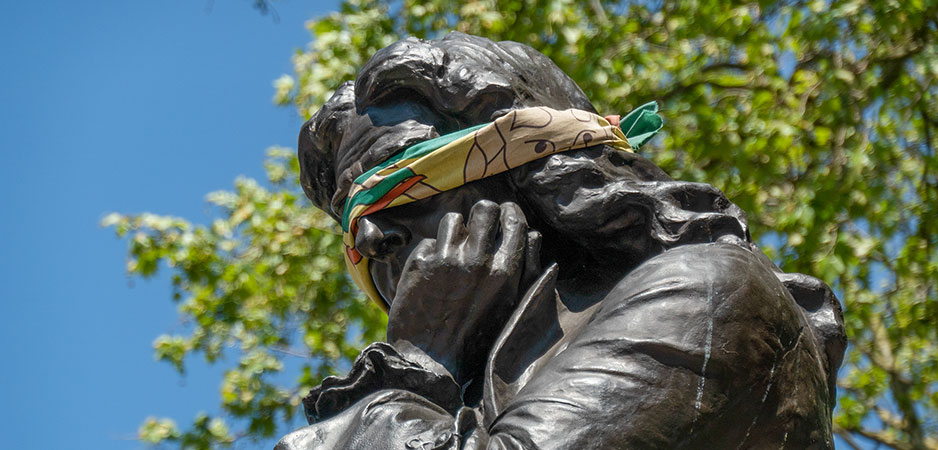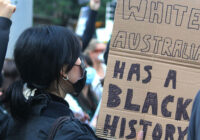Since the toppling of the statue of slaver Edward Colston in Bristol last month, a stream of articles, many by white writers, have called for such monuments to be placed in museums. These writers argue that, with sensitive curation, such statues can act to educate a public ignorant of the suffering inflicted by abusive systems of power like the slave trade.
But the educative powers of Victorian-era statues are, to say the least, dubious. Texts educate us. Narratives educate us. Images certainly can educate us. But to do so, they require qualities such as imagination, surprise, immediacy, beauty, honesty — all of which absent from these dull, obedient, often flattering likenesses in inert grey stone. Given that nobody requires these old statues of Colston or Robert Clive to understand those figures’ historical relevance, is it not insensitive, during the most passionate anti-racism protests in living memory, to instantly call for their conservation?
Gone With the Wind: On the Pitfalls of Symbolic Politics
The museum champions manifest a failure of empathy. Also, they demonstrate a desire for stasis — conservation over change, resurrection over reform. It’s no coincidence that it is a Conservative government that is misreading the Black Lives Matter movement with such shameful incompetence. From the Windrush scandal to Foreign Secretary Dominic Raab’s failure to check the origins of taking the knee before uttering his laconic “Game of Thrones” reference, the party manifests a shocking disrespect toward black British citizens.
Rather than attempting to rescue monuments, why not invent strategies for further dismantling racist structures? This argument has nothing to do with erasing history. It has never been more crucial to document our past so that every citizen feels that their history has been recognized and respected. Here, museums can and do play an essential role. It’s vital that the activity of June 2020 is chronicled with care and intelligence. Hopefully, that process will be led by its actors. The best historians enable us to tell our own stories.
This is a moment in which centuries-old pain has manifested itself with vital, electrifying intensity. That anger is being expressed not just with passion but with enormous creativity: Social media is alive with dazzling poems, images and videos of iconoclastic actions so dramatic they have a performative charge. Hopefully, some of those will be preserved for the future. That is quite different from embarking on a conversation about “saving” and “curating” a past that inflicted untold suffering. For those who were not part of BLM before, it’s time to join in, to pour energy into fashioning a world devoid of such false gods.
As for the question that if it’s Colston today, will it be Churchill tomorrow — frankly, does it matter? I’m white, also Jewish. Should I be grateful to Churchill for saving my grandparents by halting Hitler’s advance? Or should I be angry that the British government turned away thousands of Jewish refugees when officials knew the fate that awaited Jews who remained in Nazi-occupied Europe? Churchill’s active anti-Semitism is disputed, but his racism isn’t. He referred to Africans as “savages.” Barack Obama’s grandfather was tortured for resisting imperial rule in Kenya while Churchill was in charge. When Obama came to the White House, he returned a statue of Churchill that George W. Bush had left on his desk. If he didn’t want to see one, why should I? We don’t need a statue of Churchill to know what he was and wasn’t, to understand that sometimes cruel people can, in a particular context, do a “good” job. Roman Polanski’s film “The Pianist” is the best movie I have ever seen about the Holocaust, but I believe its director should be in prison for rape.
If the Black Lives Matter phenomenon tells us anything, it’s that images matter. Symbols matter. When, after this tumultuous June, you exhibit a desire to save the icons of oppression, it is symbolic of a desire to sustain the status quo. It suggests you have no vested interest in serious, systemic revolution.
Such thinking suggests our struggles are separate. We can only ever “listen” and “respect” the other’s story, not share it. But to repair our wounds, humanity has to see itself as a collective. This is not to deny in any way that we have different histories, that some of those histories, such as slavery, inflicted specific, dreadful and still uncauterized wounds — nor that those wounds shouldn’t be acknowledged and reparations made. Such recognition is essential for healing to take place. But it is to say that within those differences we are profoundly interdependent. If a statue offends my sister, regardless of our different ethnicities, it also offends me.
The views expressed in this article are the author’s own and do not necessarily reflect Fair Observer’s editorial policy.
Support Fair Observer
We rely on your support for our independence, diversity and quality.
For more than 10 years, Fair Observer has been free, fair and independent. No billionaire owns us, no advertisers control us. We are a reader-supported nonprofit. Unlike many other publications, we keep our content free for readers regardless of where they live or whether they can afford to pay. We have no paywalls and no ads.
In the post-truth era of fake news, echo chambers and filter bubbles, we publish a plurality of perspectives from around the world. Anyone can publish with us, but everyone goes through a rigorous editorial process. So, you get fact-checked, well-reasoned content instead of noise.
We publish 2,500+ voices from 90+ countries. We also conduct education and training programs
on subjects ranging from digital media and journalism to writing and critical thinking. This
doesn’t come cheap. Servers, editors, trainers and web developers cost
money.
Please consider supporting us on a regular basis as a recurring donor or a
sustaining member.
Will you support FO’s journalism?
We rely on your support for our independence, diversity and quality.






